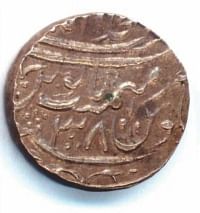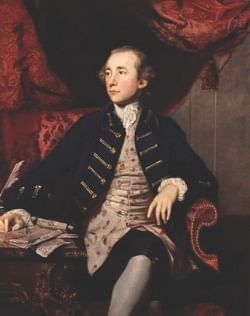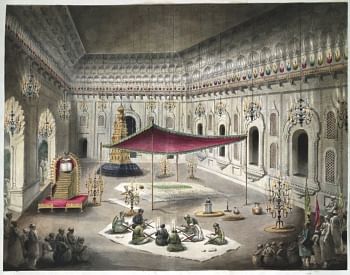| Home - Back Issues - The Team - Contact Us |
 |
| Volume 12 |Issue 05| February 01, 2013 | |
|
|
History WATERWAY OF TEARS Azizul Jalil “Tari ki raah se jata hai qafala dil kae"
Through Hyder's vivid images of the real characters, one gets to sense the tragedy of the unfolding drama and the utter humiliation of India at the hands of the British. At that time, the John Company (East India Company) by bribery, trickery and force dominated India under the titular Mughal Emperor, Bahadur Shah Zafar. The nominally independent native states with their kings and rajas were being gradually annexed by the company under various pretexts. Lord Dalhousie was then the Governor-general of India and he decreed that if any ruler did not have a male child (adopted children would not be admissible), his state would be subject to annexation. If a ruler is not able to ensure good governance and the people were discontented, his state could also be taken over by the Company, which retained the arbitrary right of such determination. The king of Oudh at the time was Wajid Ali Shah - a 37-year-old man of many talents and refined tastes. He was an accomplished musician, had composed thumris and perfected the kathak dance. The company alleged that his state was being misgoverned and on that excuse the popular ruler of Oudh was asked by the British Resident of Lucknow to leave in January 1856. He agreed to banishment in Calcutta for the rest of his life. Begum Hazrat Mahal, the King's wife, however stayed back in Lucknow – she would not accept the British decision. The king took a long and tiring journey to Benaras and then by boat to Allahabad from where he went by horse-drawn carriage to Calcutta. There he rented a mansion belonging to the Maharaja of Burdwan in Metia Burj. The annexation of Oudh by the company in 1856 was one of main reasons why Oudh became the major seat of the Indian popular uprising of 1857-59. When the mutiny broke out, Wajid Ali was imprisoned in the Fort Williams in Calcutta. Oudh is now a part of the state of Uttar Pradesh.
In Lucknow, the British auctioned off the king's palaces and valuables. People mourned the departure of the king – they were in tears. They sold his huge tuskers (elephants with large side teeth.) Even in the eyes of the elephants there were tears. When the British tried to explain it by saying that probably they had irritation in the eye, the old mahouts informed they never had that experience before. The king's mother, Begum Malika Kishwar, with about 100 close relations and courtiers, had accompanied the king to Calcutta. From Calcutta, she decided to go to London with her second son, General Sikander Hashmat and protest against the unjust ousting of Wajid Ali Shah to the company's Board of Directors and Queen Victoria, and to request for a review and redress. When on June 18, 1856 the ship passed by Metia Burj, standing on the upper-floor veranda of his house, the king waved a tearful goodbye to his mother and brother. On the way, Begum Kishwar rested in Cairo for 10 days and then on August 30, arrived in London via Southampton. She was received with due protocol at every place. In London she rented a huge building called the Harley House. General Sikander went over to the India House and presented his case to the Board. He denied all charges against his brother, King Wajid Ali. There was no satisfactory response. His mother then met Queen Victoria who received them with courtesy. The Queen Mother said, “We had never sailed in a boat on our sweet stream called the Gomti. Now we have crossed the seven seas to seek justice for our son.” Nothing came out of that visit either. The case was then taken to the British Parliament where many members were sympathetic and were of the opinion that the company's actions in Oudh were unjustified. Meanwhile, in May 1857, the mutiny by the Indian troops in the British army had started in Meerut. Reports started coming in and published in London newspapers of killings of British men, women and children in north Indian cities. In that atmosphere there was little hope of getting any redress. Moreover, money was running out and the visitors from Oudh decided to return to India via Paris. There, broken in spirit and tired of all the journeys, the Queen mother fell sick and died in Paris. The French government gave the Begum a state funeral. The funeral procession was joined by the French prime minister and she was buried in the compound of the Turkish Embassy in Paris. Sadly, within months her son and grand-daughter also died in Paris.
Months before Begum Kishwar's death, her daughter-in-law Hazrat Mahal decided to defy the British. A brave and intelligent lady, she mustered her followers and troops and started to drive the company officials from Lucknow. The Hindu rajas in her kingdom were extremely loyal to her and fought bravely. During the company rule, people used to say 'Khalque Khuda ki, Mulk Badshah ka, Hukum Company Bahadur ka'. In the nine months Oudh remained free from June 1857 to March 1958, people were glad to eliminate the last part about the company hukum. On September 16, 1857, Lord Clyde with troops arrived to retake Lucknow. General Outram, fighting alongside Clyde, audaciously asked the royal ladies to vacate the palace as he planned to have breakfast there at 10 am the next morning. Queen Hazrat Mahal, with the support of her loyal commanders, decided to fight and was valiantly able to hold on for six months. But her ill–equipped Lashkars (militia) with little training were no match for the British army who had superior arms and training. On March 21, 1858, Hazrat Mahal, followed by a large number of the inhabitants of Lucknow, decided to retreat to Deogarh, near the Nepalese border. As Rana Jung Bahadur, the Nepalese ruler, had become friends with the British he offered no help. Many of the queen's commanders fought the Gurkhas and were killed and many others, who would not leave the queen and surrender, died of malaria in the rain-forests of the Terai. In the end, the queen was given asylum in Nepal where she died in 1879 and remains buried in Kathmandu in a nameless grave. The British, with cannons and fire, destroyed half of Lucknow. As in many other parts of India, they went for wholesale retribution, destruction of properties and hanging anyone who was suspected of rebellion. In November, 1858, Queen Victoria by a proclamation took over the administration of India, which was put under the direct rule of the British government. It is interesting to note that even after she had to abandon Lucknow, Queen Hazrat Mahal issued a counter proclamation in which she stated: “These are old affairs; but recently in defiance of treaties and oaths and notwithstanding that they owed us millions of rupees, without reason and on pretence of misgovernment and discontent of our people they took our country and property worth millions of rupees. If our people were discontented with our Royal predecessor Wajid Ali Shah, how come they are content with us? No ruler ever experienced such loyalty and devotion of life and goods as we have done. What then is wanting that they do not restore our country.” |
||||||
Copyright
(R) thedailystar.net 2013 |
 T
T
